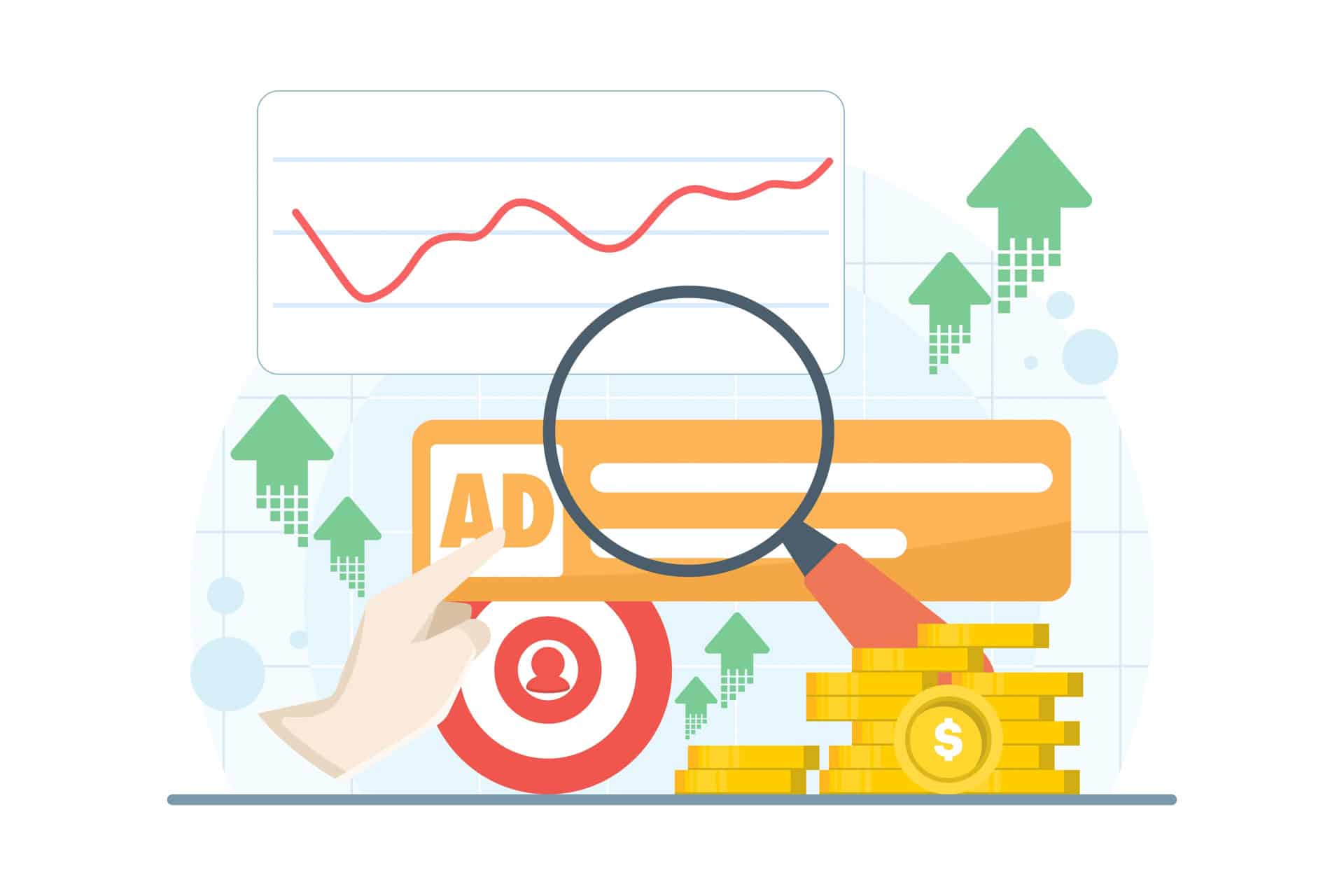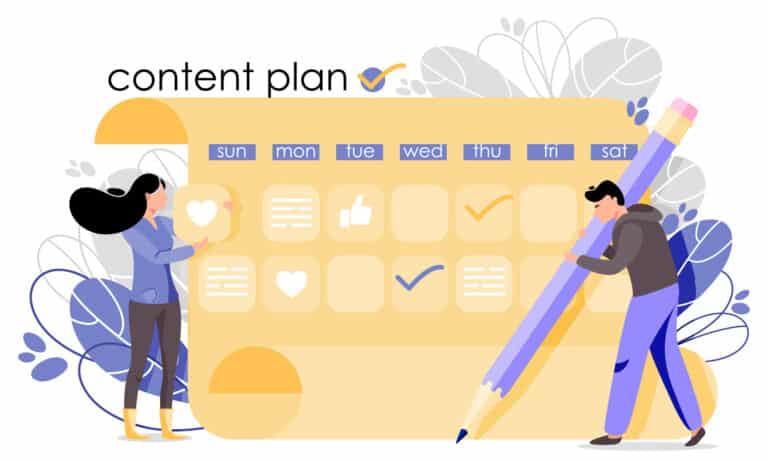Here’s a rundown of what’s new and noteworthy so far with the search industry in 2023, for all your paid and organic search needs. We’ll also cover the surprising latest news from Microsoft’s Bing, and what that might mean for the future of search.
AI Meets Search
We’re starting with Bing because, for one of the first times in its history, Bing is making headlines for being on the bleeding edge of the industry.
This week, Microsoft has started the launch of their new AI-powered search engine, fueled by a version of OpenAI’s now-famous ChatGPT: GPT-3.5.
The new Bing will show AI-fueled answers to searcher’s questions on the right hand panel of the search results page. It cites its sources, as the AI will be pulling these answers from across the web, but is intended to offer a complete answer in and of itself, without the need for users to click through to various publisher’s websites.
An example Microsoft offers is the prompt ‘I need to throw a dinner party for 6 people who are vegetarian. Can you suggest a 3-course menu with a chocolate dessert?’. You might see something like this:
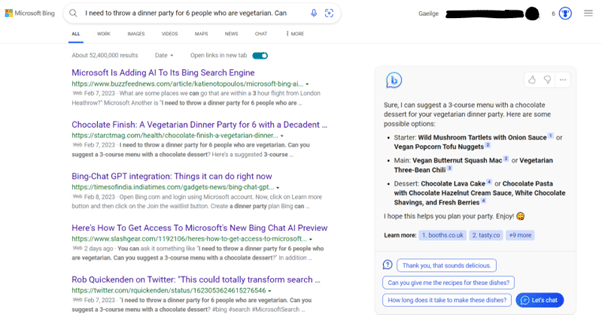
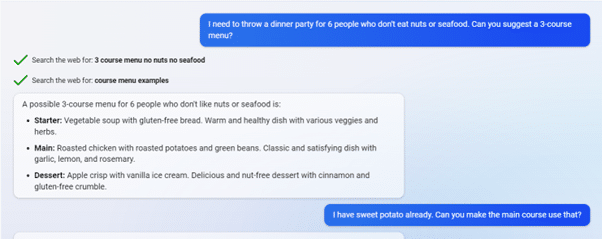
Microsoft is calling their new GPT-fueled model Prometheus, which may feel like a bit of a stretch, but applying the AI model to the Bing core search engine ranking (as well as to the new, user-facing chat features above) has offered what search experts are calling “the largest relevancy jump in search in two decades”. Perhaps comparing it to stealing fire from the gods for the birth of a new age isn’t as much of an exaggeration as you’d think.
All that being said, while this is a huge upheaval for the industry and everyone will need to innovate heavily in response, Bing’s market share currently stands at 4% of all search traffic. This may shift rapidly over the coming months – watch this space.
Google’s AI Response: Bard
Google isn’t resting on its laurels. It has quickly followed suit by announcing the soft launch of Bard, their response to ChatGPT.
Bard will stand alone as an AI chat program, much like ChatGPT currently does, but will also be integrated into search results. Here’s an example from Google of how it might look:
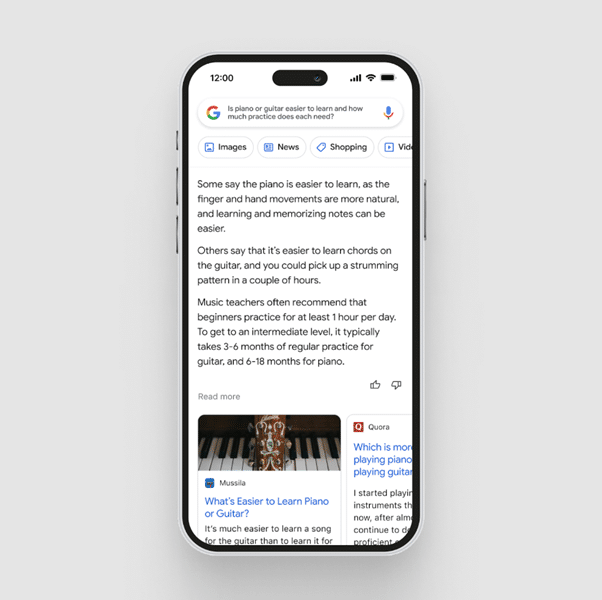
As you can see, it’s a similar format to Google’s current Rich Snippets, but written in more natural language and, unlike Rich Snippets or Bing’s Prometheus model, not clearly citing its sources – at least as far as we can tell. This, we suspect, will have significant pushback from publishers if Google doesn’t make changes.
Like the updated Bing, Bard, both standalone and as integrated into Search results, is in beta testing.
AI being so strongly integrated with search engines going forward raises a huge number of questions. From issues of intellectual property, questions of accuracy (ChatGPT is well known to get facts and figures frequently wrong, and Google’s single sample of what Bard might look like – an example of someone asking about new discoveries from the James Webb Space Telescope – contains a factual error), to what it means for the internet, a large portion of which depends on ad revenue based on site traffic and banner clicks, if suddenly many people aren’t clicking through to websites at all, there are thousands of unanswered questions about the future of search.
We’ll have to wait and see.
GA4: Google Keeps Pushing
If you’re a manager of a Google Analytics property, you’ve likely received an email or two from Google since the start of February.
It states that starting in March, if you haven’t already set up a GA4 with at least the basic settings configured, Google will do it for you. It will create settings consistent with your existing Universal Analytics property. You do have the option to opt-out, but Google doesn’t recommend it.
Some advertisers may have been holding out hope that Google’s July 1 2023 deadline for the sunsetting of Universal Analytics, but this seems to indicate Google isn’t considering that. Instead, they’re pushing advertisers and webmasters to make the switch now, to maximize the amount of historical data you’ll have access to.
If you have a GA4 course sitting in your to-do list, this might be the month.
Account-level Negative Keywords Now on Google
If you’ve run search campaigns on Google Ads, you’re familiar with negative keywords. These are words that you don’t want your ads to show for in search results. For example, if you’re advertising for a hotel without a pool, you don’t want to show for searches for ‘hotel with pool’ – both you and the user will be disappointed with the results!
However, negative keyword lists have previously only been applied at the campaign or ad group level. Now, you can set them for a whole account.
Why is this important? As well as streamlining the process, a significant win here is being able to set negative keywords for Search and Shopping inventory in all campaign types, including Performance Max, which we can’t otherwise apply negative keywords to. Performance Max limits manual management, but at least now we can exclude competitors, services your business may not provide, and similar terms that you wouldn’t expect to see any conversions from.
If the search industry made a New Year’s resolution to shake things up, they’re certainly following through! Keep an eye out – we’ll keep you updated on the next changes as they come.


